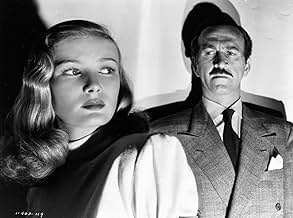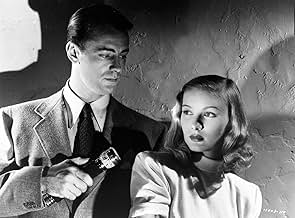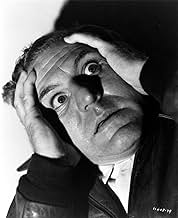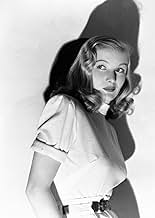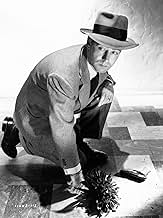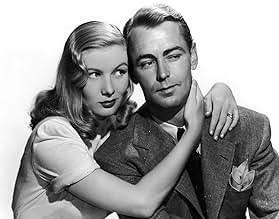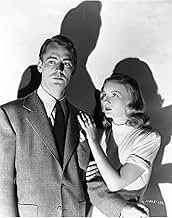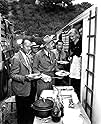- Nominated for 1 Oscar
- 1 win & 1 nomination total
Bea Allen
- News Clerk
- (uncredited)
Harry Barris
- Bellhop
- (uncredited)
George Barton
- Cab Driver
- (uncredited)
Mary Bayless
- Bar Patron
- (uncredited)
Edward Biby
- Restaurant Patron
- (uncredited)
Nina Borget
- Mexican Waitress
- (uncredited)
- Director
- Writer
- All cast & crew
- Production, box office & more at IMDbPro
Featured reviews
The trailer for The Blue Dahlia advertised the film as Ladd, Lake, and Bendix. Not a mention about Raymond Chandler, maybe he wanted it that way.
The Blue Dahlia has mystery writer Raymond Chandler writing an original screenplay and Chandler delivers a good movie for the most part. Nice suspenseful noir film, but it could have been better.
The main weakness in the plot is Veronica Lake. Chandler couldn't stand her and called her Moronica Lake as a reflection of her acting ability. In fairness it's a poorly defined role and her meeting with Alan Ladd in this film is too too coincidental. I guess you had to give the star a love interest, but the idea that Ladd is hunting for the killer of his wife and just happens to come upon the wife of his number one suspect is way too unreal.
The number one suspect of the killing is Howard DaSilva. If I had to name the best performance in this film it would have to be DaSilva. He's the dapper, elegant owner of a Hollywood nightclub, but he exudes a menace that chills you. His best scene in the film is paying off blackmailer Will Wright. He pays him, THIS TIME. Wright gets the message he'd better not come back for more.
I believe it was Raymond Chandler who also said that Alan Ladd was a small boy's idea of a tough guy. That is unfair to Ladd who delivers a more than competent performance here as the returning war veteran who's on the hunt for his wife's killer while being suspected of the crime itself.
Check out Alan Ladd's scene at the farm with DaSilva's thugs. Very similar in the way they end up to how Bogart handled the baddies in The Big Sleep.
Bill Bendix gets in the top billing with stars Ladd and Lake because he's also a radio star because of the Life of Riley Show. Bendix and Hugh Beaumont are Ladd's wartime buddies and Bendix never was bad in any film he did. He shows signs of post traumatic stress at a time when that diagnosis had not been invented.
A bit too contrived, but a nice film noir.
The Blue Dahlia has mystery writer Raymond Chandler writing an original screenplay and Chandler delivers a good movie for the most part. Nice suspenseful noir film, but it could have been better.
The main weakness in the plot is Veronica Lake. Chandler couldn't stand her and called her Moronica Lake as a reflection of her acting ability. In fairness it's a poorly defined role and her meeting with Alan Ladd in this film is too too coincidental. I guess you had to give the star a love interest, but the idea that Ladd is hunting for the killer of his wife and just happens to come upon the wife of his number one suspect is way too unreal.
The number one suspect of the killing is Howard DaSilva. If I had to name the best performance in this film it would have to be DaSilva. He's the dapper, elegant owner of a Hollywood nightclub, but he exudes a menace that chills you. His best scene in the film is paying off blackmailer Will Wright. He pays him, THIS TIME. Wright gets the message he'd better not come back for more.
I believe it was Raymond Chandler who also said that Alan Ladd was a small boy's idea of a tough guy. That is unfair to Ladd who delivers a more than competent performance here as the returning war veteran who's on the hunt for his wife's killer while being suspected of the crime itself.
Check out Alan Ladd's scene at the farm with DaSilva's thugs. Very similar in the way they end up to how Bogart handled the baddies in The Big Sleep.
Bill Bendix gets in the top billing with stars Ladd and Lake because he's also a radio star because of the Life of Riley Show. Bendix and Hugh Beaumont are Ladd's wartime buddies and Bendix never was bad in any film he did. He shows signs of post traumatic stress at a time when that diagnosis had not been invented.
A bit too contrived, but a nice film noir.
Raymond Chandler wrote this script and it is him through and through, I think. It's a very bleak tale of returning war veterans' findings when they reach "home." Unfaithful wife, hoodlums, and just general corruption and bleakness. The scenes with Veronica Lake are the shafts of light in this one's blackness (what did you expect, she's Veronica Lake, one of the most beautiful screen starlet ever), but all in all it conjours up dark images in one's mind. I once heard someone argue that this wasn't film noir. I disagree as much as I can. There is much inner struggle in the characters, settings of bleakness, amnesia, corruption everywhere, unfaithful spouses, murders, cops, criminals, and finally the dark visual expression (with rain as an added bonus). Do not miss this film.
"The Blue Dahlia" (1946) is a film noir directed by George Marshall and stars Alan Ladd, Veronica Lake, William Bendix, Howard Da Silva and Will Wright. It was the third pairing of the box-office bombshells Ladd and Lake and it is a marked improvement on their previous two outings, "This Gun for Hire" and "The Glass Key", both from 1942. The key credit to this should probably go to scriptwriter Raymond Chandler, probably the best hardboiled crime novelist there ever was along with Dashiell Hammett.
The story is classic noir: Johnny Morrison (Ladd), war veteran of the South Pacific, returns home to find his wife (Doris Dowling) has been unfaithful. He walks out on her, and shortly after she is found dead. His war buddies Buzz Wanchek (William Bendix) and George Copeland (Hugh Beaumont) believe he is innocent, but everything points towards to Morrison...
The screenplay has some vintage Chandler lines, and characters like Bendix's disturbed veteran and Wright's marvelously smarmy house peeper could have jumped out of his Philip Marlowe novels. However, the ending is weak due to interference from the U.S. military, but the movie as a whole still packs a sizable punch. Director Marshall serves his material admirably and cinematographer Lionel Lindon gives us some very dark and atmospheric shots. Acting wise, Bendix takes the top honours, but Ladd and Lake are both very good, as is Howard Da Silva, owner of the eponymous "Blue Dahlia Club" .
This film noir is one definitely to check out.
The story is classic noir: Johnny Morrison (Ladd), war veteran of the South Pacific, returns home to find his wife (Doris Dowling) has been unfaithful. He walks out on her, and shortly after she is found dead. His war buddies Buzz Wanchek (William Bendix) and George Copeland (Hugh Beaumont) believe he is innocent, but everything points towards to Morrison...
The screenplay has some vintage Chandler lines, and characters like Bendix's disturbed veteran and Wright's marvelously smarmy house peeper could have jumped out of his Philip Marlowe novels. However, the ending is weak due to interference from the U.S. military, but the movie as a whole still packs a sizable punch. Director Marshall serves his material admirably and cinematographer Lionel Lindon gives us some very dark and atmospheric shots. Acting wise, Bendix takes the top honours, but Ladd and Lake are both very good, as is Howard Da Silva, owner of the eponymous "Blue Dahlia Club" .
This film noir is one definitely to check out.
My recording off UK Channel 4 13th Feb 1987 is nearing its end cycle, hopefully the next time I want to trot this episodic classic out it'll be on DVD. Because it was Chandler I always regarded it maybe too highly, but it certainly has some powerful noir-ish moments whilst remaining essentially a normal Paramount studio-bound potboiler.
War vet Alan Ladd comes home to find his wife playing around, gets accused of murdering her while being picked up by Veronica Lake. They indulged in some snappy laconic Chandler-banter but that's as far as their relationship seemed to progress. Murder and mayhem follow Ladd while monkey-music followed his buddy William Bendix. I always wondered: how on Earth did Buzz settle down afterwards, especially when rock & roll came? Everyone has angles or axes to grind, is edgy, dislikeable, seedy or all three, the house-peeper particularly coming in for a lot of stick. Some savage and clunky fight scenes might surprise especially at the Old Cabin when juxtaposed with the romantic nightclub scene. The atmosphere throughout is perfect as was only possible on nitrate film stock. The only thing I never liked was at the climax after Hendrickson asks "You didn't think you were going to walk out that door did you?" - a heavily contrived and swift ending follows.
It was a stranger to me a long time ago, but has been a firm friend of mine for decades now. Did the horticulturists ever succeed in creating a real blue dahlia?
War vet Alan Ladd comes home to find his wife playing around, gets accused of murdering her while being picked up by Veronica Lake. They indulged in some snappy laconic Chandler-banter but that's as far as their relationship seemed to progress. Murder and mayhem follow Ladd while monkey-music followed his buddy William Bendix. I always wondered: how on Earth did Buzz settle down afterwards, especially when rock & roll came? Everyone has angles or axes to grind, is edgy, dislikeable, seedy or all three, the house-peeper particularly coming in for a lot of stick. Some savage and clunky fight scenes might surprise especially at the Old Cabin when juxtaposed with the romantic nightclub scene. The atmosphere throughout is perfect as was only possible on nitrate film stock. The only thing I never liked was at the climax after Hendrickson asks "You didn't think you were going to walk out that door did you?" - a heavily contrived and swift ending follows.
It was a stranger to me a long time ago, but has been a firm friend of mine for decades now. Did the horticulturists ever succeed in creating a real blue dahlia?
Here's another one of those classic favorites that I am still hoping gets transferred to DVD. It's been long overdue.
This is another Alan Ladd-Veronica Lake film (their third of the decade) but William Bendix steals the show as a G.I. who suffered brain damage in World War II. He is something to see and his wise-cracking lines are some of the best ever delivered in a film noir. He had a short temper and insulted everyone he came in contact with. I just laugh out loud at some of his stuff.
Doris Dowling is effective as a nasty woman and it's always fun to see Hugh Beaumont in a role other than the dad in "Leave It To Beaver." Howard da Silva and Will Wright also are entertaining in their supporting roles. Also, for you TV trivia fans: see if you can spot "Lois Lane" (Noel Neill) in here.
Never as gorgeous as billed, Lake still had a unique look and voice but she plays it pretty straight here, character-wise. I like her better when she wisecracks as she did in some of her other films.
This is a pretty good crime story. Nothing exceptional, but at least it keeps you guessing. You're never quite sure until the very end "whodunnit."
This is another Alan Ladd-Veronica Lake film (their third of the decade) but William Bendix steals the show as a G.I. who suffered brain damage in World War II. He is something to see and his wise-cracking lines are some of the best ever delivered in a film noir. He had a short temper and insulted everyone he came in contact with. I just laugh out loud at some of his stuff.
Doris Dowling is effective as a nasty woman and it's always fun to see Hugh Beaumont in a role other than the dad in "Leave It To Beaver." Howard da Silva and Will Wright also are entertaining in their supporting roles. Also, for you TV trivia fans: see if you can spot "Lois Lane" (Noel Neill) in here.
Never as gorgeous as billed, Lake still had a unique look and voice but she plays it pretty straight here, character-wise. I like her better when she wisecracks as she did in some of her other films.
This is a pretty good crime story. Nothing exceptional, but at least it keeps you guessing. You're never quite sure until the very end "whodunnit."
Did you know
- TriviaThe pressure of having to finish the screenplay combined with the curveball of having to write an entirely new ending was too much for Raymond Chandler. He quickly came down with a severe case of writer's block. According to a near-legendary story, Chandler offered to finish the screenplay by working drunk; in exchange for sacrificing his health to produce the requisite pages on time, Chandler was permitted to work at home (a privilege rarely granted to screenwriters) and was provided two chauffeured cars, one to convey the completed pages to the studio and the other for his wife. Chandler turned the script in on time. Many now believe the drunkenness was simply a ruse by Chandler to wrangle extraordinary privileges from the desperate studio.
- GoofsJoyce tells Johnny that the tide is out. Clearly the tide is all the way in, completely covering the beach.
- Quotes
Joyce Harwood: Well, don't you even say 'Good night'?
Johnny Morrison: It's "good-bye", and it's tough to say good-bye.
Joyce Harwood: Why is it? You've never seen me before tonight.
Johnny Morrison: Every guy's seen you before somewhere. The trick is to find you.
- ConnectionsFeatured in The Hollywood Collection: Alan Ladd: The True Quiet Man (1999)
- How long is The Blue Dahlia?Powered by Alexa
Details
Box office
- Gross US & Canada
- $2,700,000
- Runtime1 hour 36 minutes
- Color
- Aspect ratio
- 1.33 : 1
Contribute to this page
Suggest an edit or add missing content



